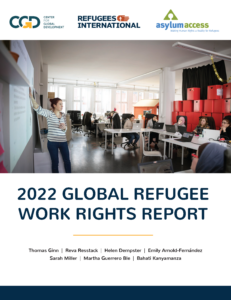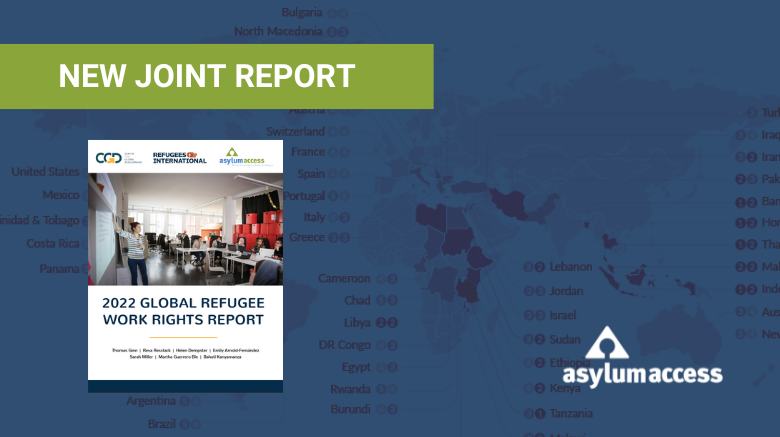Asylum Access, together with the Center for Global Development (CGD) and Refugees International, has published an in-depth report comparing refugees’ work rights in policy and in practice worldwide.
Refugees’ right to work has been repeatedly recognized in international agreements—from the 1951 Convention Relating to the Status of Refugees to the 2018 Global Compact on Refugees—and research continues to demonstrate the benefits of this right for refugees and their host countries alike. Yet most refugees today face significant legal and practical barriers to full economic inclusion in the labor markets of their host countries.
In this project, co-authored by Asylum Access, Center for Global Development (CGD), and Refugees International, we assess refugees’ work rights across the globe. We examine different dimensions of work rights both in law (de jure) and in practice (de facto) across 51 countries that were collectively hosting 87 percent of the world’s refugee population at the end of 2021. Combining legal documents, country-level reports, news articles, and input from more than 200 practitioners with knowledge of refugees’ livelihoods and use of services, we evaluate the de jure and de facto situation within a standardized framework. We believe that the findings and accompanying dataset will be critical tools for policymakers, practitioners, and researchers on refugees’ work rights.
“Refugee hosting countries should extend the right to work, freedom of movement, and rights at work to all displaced people being hosted in their countries. Refugees and other displaced groups of people are human beings with families to provide for.” adds Bahati Kanyamanza, Asylum Access Associate Director of Partnerships and co-author of the report.
The report is also accompanied by an interactive website to showcase the report, which can be accessed at refugeeworkrights.org

Key Findings
- Every country in this study imposes barriers to refugees’ work rights in practice.
- There is a stark difference between refugees’ overall work rights in law and in practice.
- At least 62 percent of refugees live in countries where the legal framework for work rights is adequate or better (a 4 or 5 on our five-point scale).
- Yet many of these laws are not widely implemented: at least 55 percent of refugees live in a country that significantly restricts their work rights in practice (a 3 or below on our scale), and at least 19 percent of refugees live in a country that severely restricts their right to work in practice (scoring a 1 or 2). This represents at least 16 million and 5.5 million people, respectively.
- While the law is not enough to guarantee refugees’ right to work, it is oftentimes a necessary starting point: de jure and de facto scores are strongly correlated, and only 3 of the 19 countries in our sample that have adequate access in practice do not have adequate access in law.
- Amid hope for the Global Compact on Refugees and fear over the impact of COVID-19, we do not see a significant net change in the right to work over the last five years. Approximately 28 percent of the global refugee population lives in a country where access to wage employment in practice has improved, while 29 percent lives in a country where it has worsened.
Recommendations
The report also provides a series of recommendations targeted at both refugee-hosting countries and donors that would reduce the many barriers identified in our data.
Refugee-hosting countries should:
- Ensure that domestic laws grant refugees the right to work and freedom of movement, and that these rights are upheld in practice.
- Automatically include the right to work and freedom of movement in refugee status.
- Safeguard refugees’ rights at work through enforcement and support legal aid for refugees who experience workplace violations.
- Involve refugees in policymaking and accountability mechanisms.
Donors should:
- Incentivize host governments to expand refugees’ right to work.
- Strengthen accountability mechanisms for international pledges and involve experts (including refugees) in their design.
- Support local organizations advocating for refugees’ work rights.
- Provide support to host communities in addition to refugees.
Our findings highlight the many barriers to employment that refugees face and the opportunities for the refugee-serving community to intervene and expand access to work rights. This report provides a global overview of refugees’ work rights today and how they may be improved upon in the years to come.
Download the Report

Have questions about the report? Get in touch with us.

